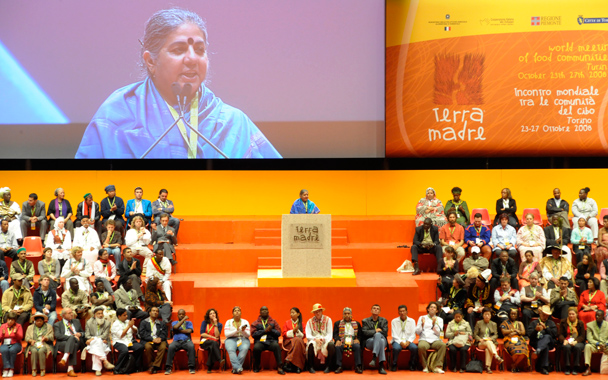Nearly six years ago at the age of 23, I began a journey toward becoming a farmer. I started with an apprenticeship that grew to a small livestock farm in Central Arkansas. I did not come from a farming family, and most of the farmers I knew were large-scale commodity farmers. But along the way I found out that Slow Food was holding a meeting in Turin, Italy to gather together farmers who are concerned about quality food and the environment. When I was selected as a delegate to that first Terra Madre gathering, all I had to do was buy a plane ticket and everything else would be taken care of. That trip opened me to a whole new community of sustainable farmers from around the world. So when I had the opportunity to go again this year, I jumped at the chance.
This past Thursday I made my way from my farm in central Arkansas to join more than 4,000 farmers and 2,000 chefs, educators, and other food advocates in Turin, Italy. We came for Terra Madre—literally “mother earth”—a conference of world food communities organized by Slow Food International to promote food that is “good, clean, and fair.”
This was not a meeting of the world’s elite; those gathered here are the humble of the earth—those who live close to the land. There were African women in long, colorful dresses, Afghan men in robes and turbans, Peruvian herders in colorful Angora hats. And above all, there are young people. Almost half of the U.S. delegation of more than 700 people is under 30. Perhaps the greatest hope at the opening came when Sam Levin, a 15-year-old high school student, shared his story of gathering students together at his Massachusetts school to grow a vegetable garden on an old soccer field to provide good food for the cafeteria. This youth presence is perhaps the greatest hope to come from the gathering. It is a sign that the next generation of farmers will be one that values the earth and seeks to renew from the abuses of the past.
Despite our different backgrounds, there was sense that we are all farmers facing the same challenges from the global industrial food system. Our seeds are being patented by companies like Monsanto; our food systems are being consolidated into the hands of a few multinational corporations; and the agricultural tide of all of our countries is moving toward homogeneity, rather than the variety and quality provided by people who truly care for the land. As chef and Slow Food vice president Alice Waters said at the opening ceremony, those of us gathered at Terra Madre were there to create a “global counterculture—a dynamic way of thinking in opposition to fast-food values.”
With all of the woes facing the world, from the food crisis to the financial crisis, there was a sense of hope and mission at the opening ceremony. Prince Charles, a longtime advocate of organic agriculture, sent a video message to the delegates: “You are the guarantors of our long-term food security.” That was a recurring theme in the plenary talks, the idea that when the agriculture of heavy machinery, genetically modified crops, and petroleum-dependent fertilizers fails, it is “subsistence agriculture that is going to be the basis for sustainable food production,” as Tewolde Berhan Gebre Egzanher, the director of Kenya’s EPA, put it.
In the coming days we will have reports from the numerous small workshops at Terra Madre and the Salone del Gusto, Slow Food’s world food fair. I’m particularly excited for the launch of the Terra Madre Youth Network, and the opportunity to talk with farmers from around the world.



 Pinterest
Pinterest


